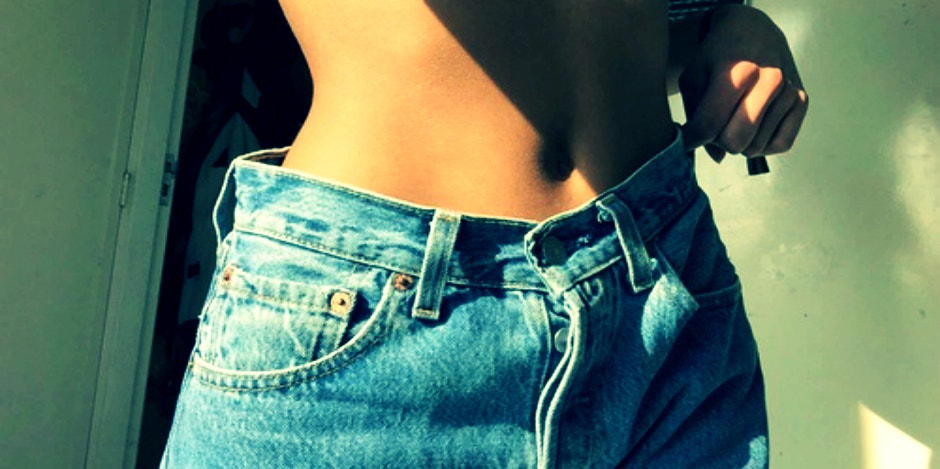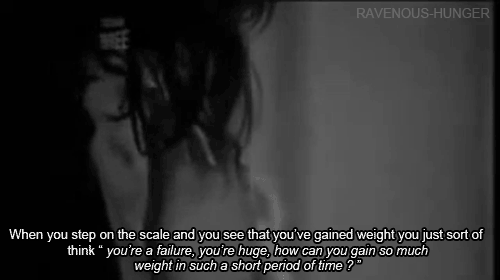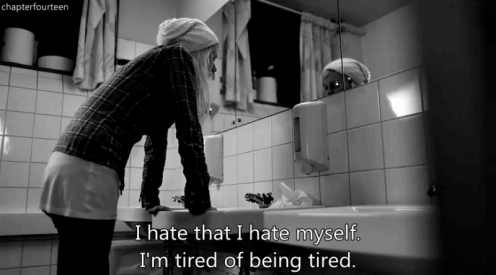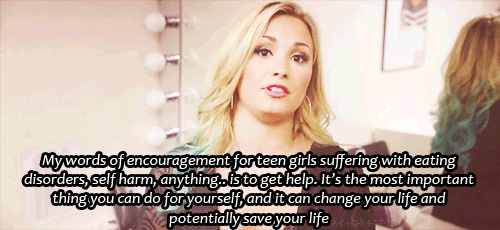The Inescapable Haze Of Life With An Obsessive Eating Disorder
You delusionally think that when the disorder is gone, the special parts of you are gone.
 weheartit
weheartit It's hard to think about the consequences. When you get into the habit of waking up each morning wishing that you hadn't, and living each day in an inescapable haze of obsession, starvation, and self-hatred, you realize that believing things will one day be better is a little like believing in Santa Claus. It seems like a waste of time.
You see, eating disorders have this nasty habit of invading every single part of your life; they sidle up beside you with all the innocence of a new best friend and chisel away at your identity until you don't know who you are without them.
They whisper promises of bones and beauty, and cover the world around you with cartoon mirrors from a f*cked up children's fair — mirrors that show you as ugly and fat. Mirrors that show you as worthless.
But then something happens. Maybe you've been forced into therapy, or maybe it was your own choice. Maybe someone finally got through to you, or maybe you somehow realized that this wasn't just a disorder — it was a suicide. However it came to be, those first few steps into recovery open your eyes, and once you can see again, it is impossible to look away.
There is destruction and devastation everywhere you turn, but for the first time, you begin to understand that you are not the cause of all of this pain; your disorder is. You begin to separate yourself from the diagnosis. You begin to remember who you were before you were a sad excuse for a human calorie calculator.
You begin to put your life back together without the disorder that has successfully occupied your every waking thought, breath, and action. And it's terrifying.
I like to think of life after an eating disorder as divided into two categories: the immediate, and the extended. The immediate is where you question everything: Am I going to be fat? Am I going to be happy? Am I going to be better? And then, most importantly of all, Do I want to be? After all, eating disorders are addictions.
There is something about them that is tantalizing, even seductive, and when you are toeing the line of recovery, you are also constantly questioning if you actually want to hop over it for good. You think that when the disorder is gone, the special parts of you are gone; you think that because you can starve, lie, purge, and cut that you are part of some sort of secret society, and that when you start to eat more than 300 calories a day you are giving up your key card. It is nighttime when you think these things.
Then the sun comes up and you say, "Yes, yes I do... I want to get better."
You follow a meal plan, go to group meetings and even mean it sometimes when you smile. Things are going well until you are removed enough from the disorder that you forget how much it hurt you.
That addiction starts to creep back, and a little voice in your head says, "Hey, you know what, maybe you can do it better next time. Maybe you can be a happier version of dead girl walking, you know, maybe you can slowly start to kill yourself but not actually want to die. You don't have to be so sad all of the time, you just have to be hungry."
It is because of this little voice that relapse happens. Some people get pulled back in time and time again, they fall back down the rabbit hole head first and splatter all of their brains out on impact in hungerland. Maybe you've gotten pulled back under, too — I know that I have, a few times. But then there comes a day when that voice twists spun-sugar lies all around your mind, and you gather the courage to tell it to f*ck off.
Welcome, my friend, to the extended. When you've stopped being immediately allured by the lies that the disorder can tell you, you have landed yourself here. This is where you figure out who you are, or at least, who you want to be — and skinny isn't a characteristic allowed on the wish list.
This is where you paint, sing, play, or dance and figure out that you have talents other than the uncanny ability to turn off all biological safety switches and starve. This is where I figured out that I loved to write; that I loved to channel all of the emotions and intensities that I couldn't handle or understand into stories, poems, or letters.
I created worlds and devoured words with a voracity that I had only before used for self-destruction, and I began to stop thinking of myself as broken in the process. I realized that nobody is born inherently whole, but we are all born inherently blank, and that it is solely my capability to turn what I had gone through into the beginning of a life instead of a close end to one.
You can acknowledge you sometimes want go back but know life is so much better when it is actually being lived.
This is not an epiphany that should be taken for granted. From here, days may pass, or months, or years. Your disorder fades. It may not go away forever, and it may not be forgotten, but it is not in any way close to taking charge over the life that you have created.
Life after an eating disorder is messy. It is challenging, it is hard, and there will be a lot of times where you just want to lock yourself in a dark closet with a teddy bear and a box of Kleenex, never to come out again.
But that's just life. And the greatest part about it all: it can be anything that you ever want it to be.
Originally published on Unwritten, the number one lifestyle destination for millennial women.




